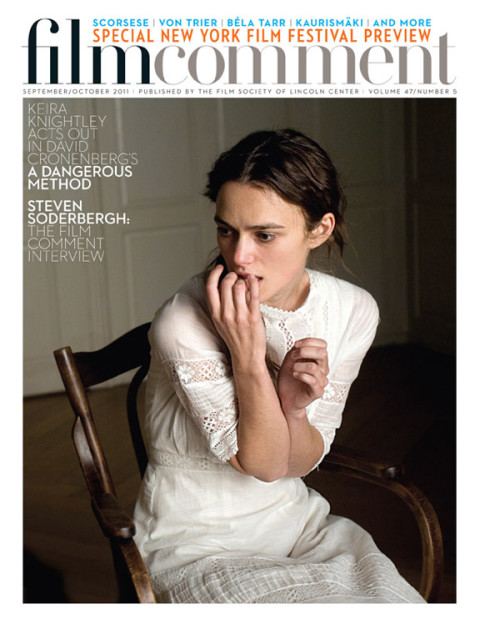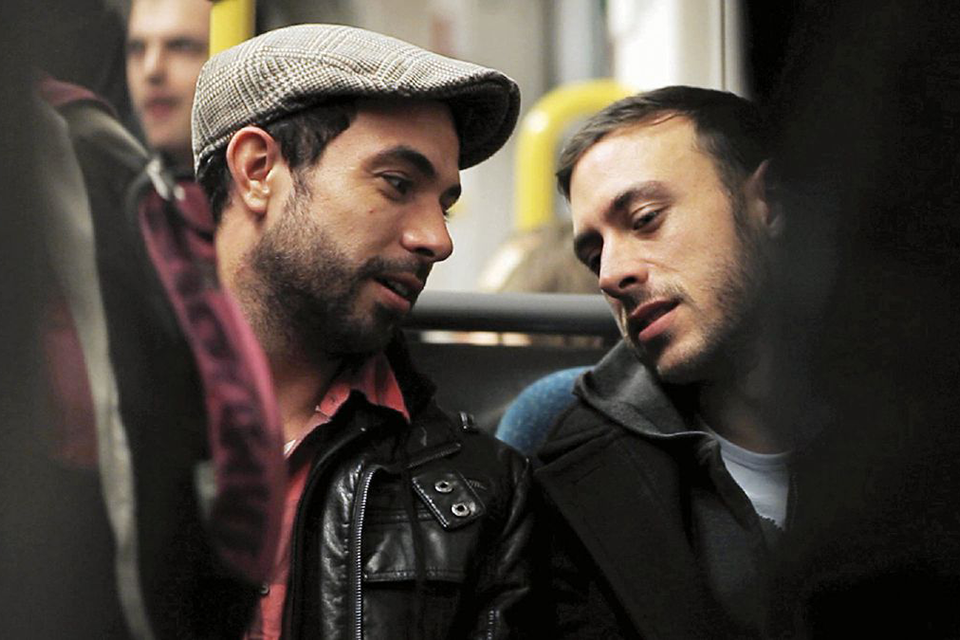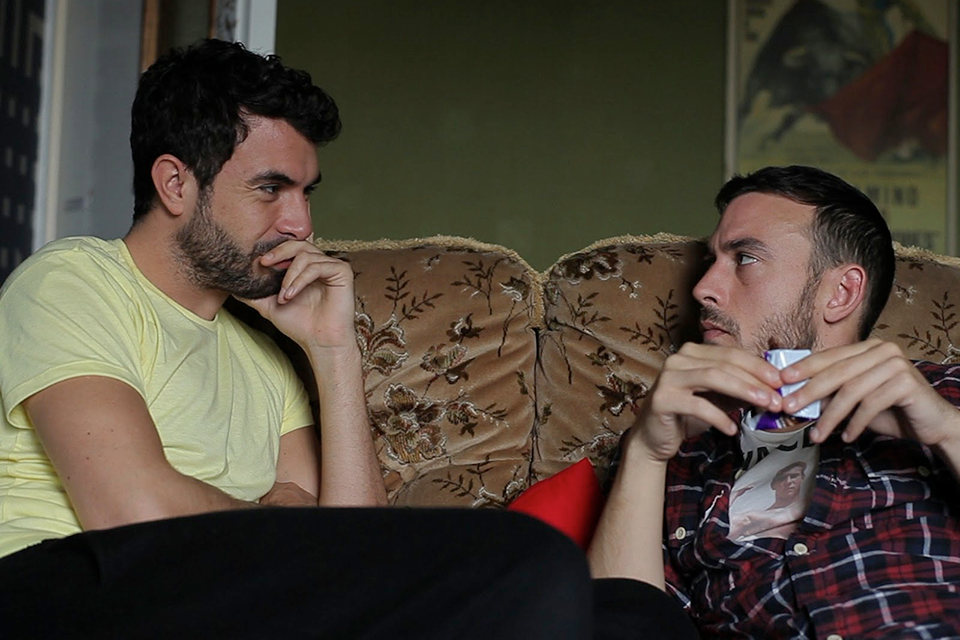
Andrew Haigh’s triumphant Weekend
Director Andrew Haigh’s Weekend, Audience Award winner in South by Southwest's Emerging Visions section, has a deceptively simple conceit. Working-class Russell (Tom Cullen) goes cruising at a gay bar in a British Midlands town and wakes up next to Glen (Chris New), who is leaving the next day to study in the States. They decide to meet up again (why not?) and a one-night stand becomes a lost weekend. There’s lots of drinking and some recreational drug use; there’s a trip to the fair and a goodbye party with Glen’s closest friends; there are explicit but unsensational scenes of casual sex. But mostly there are long and winding conversations. And then suddenly, unexpectedly, things aren’t so casual anymore.

Like the brief relationship it portrays, Weekend’s gut-punch emotional impact depends on just how unexpected its final trajectory is. Starting from a somberly kitchen-sink setup, the pitch builds slowly but with geometric progression, climaxing in an affective register that almost belongs to another genre entirely. The near-final scene would be a total cliché of tear-jerking romance if it weren’t so entirely earned and so seamlessly, devastatingly perfect.
I’m worried (really quite anxious) not to oversell the film, to create expectations when it depends so much on surprise. It’s not a matter of spoilers. There is a last-act revelation in which Russell and Glen learn they’re connected in a way that neither had realized, but it’s really not that important. The surprise of this film is just how ambitious it is: how unhurried its characterizations are, surreptitiously setting up backstory that it patiently waits to pay off; how little self-regard the actors betray, never playing the subtext in their emotionally complex performances; how totally the script avoids spelling out its themes, staging a dialogue between its leads that’s of such unpretentious philosophical resonance that you don’t quite realize how exacting it is until long after you’ve left the theater.

Cullen’s Russell is guileless without being falsely naïve. We first see him interacting with his mates at a childhood friend’s small house party. Russell seems like the gentlest and most well-adjusted boy you could ever hope to meet. “I got Lois the sweetest little present,” he says of the friend’s daughter, with a smile that just lights up the frame. “That’s why we made you the godfather,” the father responds. The exchange might be cloying if they weren’t both high as kites and passing a pipe back and forth. (That’s called counterpoint.) A drunken friend stumbles over and snatches Russell’s hat. “How do I look?” he asks, putting it on. “You look lovely,” Russell answers without a hint of irony. “Very nice.”
But your impression of Russell as emotionally unguarded and enviably grounded is subtly qualified by his late arrival and early departure in two framing scenes. He uses his job as a lifeguard to explain them away (had to work late, got to get up early) but neither is honest. The film opens on him milling about his house (lingering in the bathtub, staring quietly out the window) and continues with him heading to a gay bar. Disco lights strobing, he knocks back some drinks and cruises the room (followed in a bouncing rack-focus and subtly sloppy camerawork). After a quick tour, he heads to the dance floor. “I’ve got so much love to give” blares on the stereo and he starts to dance: stiffly at first, then closing his eyes as he tries to lose himself in the music. The camera lingers on his face as we try to puzzle out its meaning.
A few brief scenes later he’s offering instant coffee to a boy who had brushed off his advances earlier that night: Glen. They seem like a terrible match. Every line of Glen’s dialogue has an affect of carefully distanced sarcasm. As he gets ready to leave, he insists on claiming his “pound of flesh”: an audio interview for his “art project.” Prompting Russell to narrate their evening together, Glen repeatedly cuts in with shock-effect interruptions (“Then I wanted to lick your pits”) and aggressively intrusive questions. “Are you even out to your friends?” he condescendingly inquires. Russell is out, actually, though we may have wondered ourselves. Unsatisfied, Glen presses on, determined to expose some sexual hypocrisy or self-loathing contempt.

The camera holds on the exchange in near-static tableaux (each scene was filmed in flowing master shots). Russell’s monologue is intensely self-conscious but while he and Glen are so focused on his words, their faces become completely transparent. As Russell meets each provocation with beguiling awkwardness and disarming sincerity (“I just thought we had a really nice time”), we watch Glen’s carefully cultivated persona start to wilt. He can’t help but be moved and is made to feel ashamed. His eyes start to glaze over—then abruptly dart away. He stops recording and visibly shakes it off. In spite of himself, this boy has gotten under his skin, and in that moment of vulnerability years of hurt are made manifest. It wouldn’t be an exaggeration to say that these are some of the most beautifully revelatory close-ups I have ever seen.
Weekend is so delicately lyrical and intuitively direct that it almost comes as a shock to realize, upon reflection, just how philosophically schematic the characters’ positions are: two illustrative embodiments of the assimilationist and radical schools of gay politics. Glen revels in transgression: rearranging Russell’s fridge-magnets to spell FAGGOT, eagerly provoking homophobic reactions in public so he can strike back at them with arguments memorized from Introduction to Queer Theory. Most of his complaints, of course, are absolutely justified: the “boy meets girl” hegemony we’re steadily fed from birth, the gay-bashing violence and casual cruelty so relentlessly meted out, the sexless persona gay men accept so as not to offend. (“Gays never talk about sex. Straight people talk about sex all the time, but with gays it’s just cheap innuendo.”) Yet we see how emotionally deadening it is to be so relentlessly embattled, to turn a gesture of tenderness like holding hands into an act of aggression.
And with a symmetry that’s somehow not schematic, Russell embodies the parallel trap. He’s so eager not to alienate anyone that he neurotically conceals and downplays his sexuality even when he doesn’t have to—even when his reticence itself alienates. His friend, more than accepting, asks questions about his romantic life only to be misdirected and rebuffed. “We never talk about this kind of stuff,” Russell later explains when pressed on the issue. “I know,” the friend responds, visibly hurt by the response. It’s an amazing inversion that makes the psychic costs of our schizophrenically (un)accepting era tangibly real. “I’m not embarrassed,” Russell explains to Glen. “I’m not ashamed. And I don’t want to be straight.” “But…”

But: homophobia has a radioactive half-life. I can’t think of another film about gay boys that so totally spoke to my own generational experience of being queer. But (but…) Weekend is not a “gay movie,” made to be slotted in a special-interest demographic ghetto. As Glen says of his own art project: “The straights will go see pictures of war and refugees. But gay sex? Fuck it.”
Weekend is a work of surpassing emotional insight and artistic accomplishment. It’s about (yes) the human condition—and it’s already one of the best of the year.







